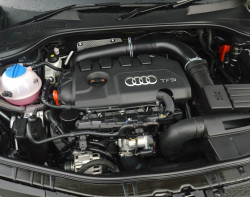
— Part of Volkswagen's $15 billion emissions settlement agreement with U.S. authorities sets aside nearly $5 billion to promote zero-emissions cars and to offset environmental damage that will continue to be caused by the vehicles even after they are repaired.
VW says a step in that direction will be taken in 2017 when gas-powered cars will be equipped with special particulate filters to reduce soot emissions by up to 90 percent.
From 2017, all gasoline TSI and TFSI engines will have the particulate filters, starting with the 1.4-liter TSI engine in the Volkswagen Tiguan and the 2-liter TFSI engine in the Audi A5.
Particulate filters in diesel engines are common and have been known to allegedly cause problems. In 2015, a class-action lawsuit was filed against General Motors concerning particulate filters used on Duramax engines.
The GM lawsuit was filed after the plaintiffs alleged defects caused decreased fuel economy due to soot filtered through the diesel particulate filter exhaust system.
The lawsuit alleges when the trucks are traveling at slow speeds for extended periods of time, the driver will receive a message telling them to drive faster so the exhaust can get hotter and clean the particulate filter.
VW didn't say what the extra expense would be for gas-powered vehicles with the filters and the automaker didn't mention about the maintenance of those filters when they get clogged.
But the automaker did brag how its gasoline engines are ranked cleanest in European Union tests, some good news in the midst of about 10.5 million "clean diesel" vehicles outside the U.S. that contain illegal software to defeat official emissions tests.




